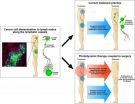(Press-News.org) The country where you live can have a big impact on your life. A new study of people from 128 countries finds that the more satisfied people are with their country, the better they feel about their lives—especially people who have low incomes or live in relatively poor countries.
The study, published in the latest issue of Psychological Science, a journal of the Association for Psychological Science, is based on a Gallup World Poll that reached about 1,000 people in each of 128 countries, obtaining a total of more than 130,000 responses. People were asked a series of questions about their life including their job satisfaction, household income, and how they feel about their life and their country.
"We predicted that people who were experiencing rough times—those with little money or living in a very poor country—would look to other areas where they might be able to console themselves," says lead author Mike Morrison, a Ph.D. candidate at the University of Illinois at Urbana-Champaign who wrote the study with Louis Tay and Ed Diener.
Indeed, that's what they found. No matter where you are in the world, feeling good about your country turned out to be highly associated with personal well-being. But this association was stronger for people with low incomes, people who live in poorer nations, and people in non-Western nations. "You can hear politicians in any country declare, 'We live in the best country in the world!' and people cheer," says Morrison, who earned his undergraduate degree from the University of Toronto. "Anyone can idealize their country"—and this appears to be a potent option for those who are worse off financially.
People in non-Western countries are on average more likely to identify strongly with a group, as opposed to the sense of individualism prevalent in the West. This could explain why non-Westerners' sense of personal well-being is more closely linked to their satisfaction with their country.
For people with high incomes and people in Western countries, well-being was more closely linked to personal factors like health, standard of living, and job satisfaction. Morrison says, "This shows that those who are very rich or live in a Western culture assess their well-being in different ways than those who are poorer or live in non-Western country."
Most studies of happiness have focused on individual lives—people's health and income, attitudes, or temperaments. "But we find here that societal characteristics, and how they are perceived, can also be important," says co-author Ed Diener, a prominent happiness researcher. "What is more, societal characteristics become even more important to happiness when one's life is not going so well. This might explain why nationalism, the loyalty of sports fans, and religiosity can be very strong in the toughest of times."
###
For more information about the Gallup World Poll, please visit these links:
http://www.gallup.com/video/106357/introducing-gallup-world-poll.aspx
http://www.gallup.com/consulting/worldpoll/24046/About.aspx
For more information about this study, please contact Mike Morrison at mmorris8@cyrus.psych.uiuc.edu.
The APS journal Psychological Science is the highest ranked empirical journal in psychology. For a copy of the article "Subjective Well-Being and National Satisfaction: Findings From a Worldwide Survey" and access to other Psychological Science research findings, please contact Keri Chiodo at 202-293-9300 or kchiodo@psychologicalscience.org.
Personal well-being is linked to national satisfaction, especially when times are tough
2011-02-10
ELSE PRESS RELEASES FROM THIS DATE:
Cocaine production increases destruction of Colombia's rainforests
2011-02-10
Cultivating coca bushes, the source of cocaine, is speeding up destruction of rainforests in Colombia and threatening the region's "hotspots" of plant and animal diversity, scientists are reporting in a new study. The findings, which they say underscore the need for establishing larger protected areas to help preserve biodiversity, appear in ACS' journal Environmental Science & Technology.
Liliana M. Dávalos and colleagues note that the pace of deforestation in Colombia has accelerated over the past 20 years, even as population growth has slowed and the economy has shifted ...
Greener process for key ingredient for everything from paint to diapers
2011-02-10
Scientists are reporting discovery of an environmentally friendly way to make a key industrial material — used in products ranging from paints to diapers — from a renewable raw material without touching the traditional pricey and increasingly scarce petroleum-based starting material. Their report on a new catalyst for making acrylic acid appears in ACS Catalysis, the newest in the American Chemical Society's suite of 39 peer-reviewed scientific journals.
Weijie Ji, Chak-Tong Au, and colleagues note that acrylic acid is essential for making paints, adhesives, textiles, ...
Toward a fast, simple test for detecting cholera rampaging in 40 countries
2011-02-10
With cholera on the rampage in Haiti and almost 40 other countries, scientists are reporting the development of a key advance that could provide a fast, simple test to detect the toxin that causes the disease. The report appears in ACS' journal Bioconjugate Chemistry. Cholera affects more than 200,000 people annually, mainly in developing countries, and causes about 5,000 deaths. Many involve infants, children, and the elderly.
J. Manuel Perez and colleagues note that cholera is an intestinal infection from food or water contaminated with the bacterium Vibrio cholerae. ...
A green way to cap an old landfill
2011-02-10
This release is available in Spanish.
U.S. Department of Agriculture (USDA) scientist Pat Millner and safety manager David Prevar have worked with the U.S. Environmental Protection Agency (EPA) and private consultants to design and conduct a pilot study for an alternative way to cap landfills.
Millner is a microbiologist at the 6,615-acre Henry A. Wallace Beltsville Agricultural Research Center (BARC) operated in Beltsville, Md., by the Agricultural Research Service (ARS), the chief intramural scientific research agency of USDA.
Prevar oversees safety and health issues ...
Photodynamic therapy against cancer
2011-02-10
Tumor cells have several routes that enable them to move from the primary tumor to distant tissues, a process called metastasis. It is metastasis of the primary tumor that kills most cancer patients. One of the least studied routes of metastasis is the lymphatic system. Many tumors produce factors that promote the formation of new lymphatic vessels (lymphangiogenesis). The newly formed lymphatic vessels enable tumor cells to travel from the primary tumor to the regional lymph nodes from whence they can spread throughout the body.
Current treatment practice is to surgically ...
Challenges for biofuels: New life cycle assessment report from Energy Biosciences Institute
2011-02-10
A combination of rising costs, shrinking supplies, and concerns about global climate change are spurring the development of alternatives to the burning of fossil fuels to meet our transportation energy needs. Scientific studies have shown the most promising of possible alternatives to be liquid fuels derived from cellulosic biomass. These advanced new biofuels have the potential to be clean-burning, carbon-neutral and renewable. Some could also be delivered through existing pipelines and used in today's engines, replacing gasoline on a gallon-for-gallon basis with no loss ...
AGU journal highlights -- Feb. 9, 2011
2011-02-10
No tipping point for Arctic Ocean ice, study says
Using microearthquakes to evaluate potential carbon sequestration sites
Observing flares from Jupiter's aurora
Change in atmospheric patterns behind Arctic sea ice summer 2010 low
Antarctic ice sheet melting would affect sea ice margin, marine food chain
Simulating ocean carbon storage during the Last Glacial Maximum
Anyone may read the scientific abstract for any already-published paper by clicking on the link provided at the end of each Highlight. You can also read the abstract by going to http://www.agu.org/pubs/search_options.shtml ...
Night games in sports stadiums and street lighting can cause spike in daytime ozone air pollution
2011-02-10
Brightly-lit Cowboys Stadium during Sunday's Super Bowl XLV may symbolize one of the hottest new pieces of scientific intelligence about air pollution: Researchers have discovered — in a classic case of scientific serendipity — that the bright light from sports stadiums and urban street lights may boost daytime levels of ozone, a key air pollutant in many heavily populated areas. That's among the topics included in a broader article about the chemistry of air pollution in the current edition of Chemical & Engineering News (C&EN), ACS' weekly newsmagazine.
In the article, ...
Young people now take longer to join adult life
2011-02-10
A research study by the Autonomous University of Barcelona (UAB), in collaboration with the State University of Campinas (Brazil), shows that young Spanish people were by 2001 taking six years longer than in 1981 to reach full employment, residential and family independence.
Spain considers itself to be a "family-centred" country, in other words, families are expected to take up the slack with regard to areas not covered by social security. "The objective was to evaluate transformations in the trends of how young people gained their independence in Spain over the last ...
Sweeping view of prostate cancer genome yields deep insights
2011-02-10
NEW YORK, CAMBRIDGE, Mass., AND BOSTON (Feb. 9, 2011) -- For the first time, researchers have laid bare the full genetic blueprint of multiple prostate tumors, uncovering alterations that have never before been detected and offering a deep view of the genetic missteps that underlie the disease. The study, made possible by key advances in whole genome sequencing and analysis, points to several new prostate cancer genes and a critical category of genomic changes as important drivers of prostate cancer growth. The work was led by researchers from Weill Cornell Medical College, ...


